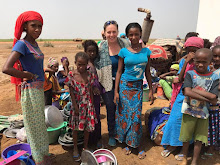
Each year I go on Home Leave. This is a perk Foreign Service Officers get for working overseas. It’s a one month holiday to the US, and it must be spent in the US. The point is: they don’t want us to forget who we are, where we are from, and what America stands for…it’s true, that’s why we get the Sabbatical.
So, every summer, my family meets at Neebish Island in the Upper Penninsula of Michigan to catch up, spend time with the nieces, and ask Amy the standard questions: “What exactly are you doing in Pakistan, and when are you coming home? Oh, and who are you dating?”
This past year, it wasn’t my mother or grandmother’s questions that surprised me, it was my brother’s.
We were doing a puzzle—I don’t think we had ever done a puzzle before—searching for the edges and the corners and Brent says,
“What’s it going to take for you to come home Aim?”
I kind of ignore the question and look for a blue edge.
My brother is a professional stuntman, actually a professional snowboarder, who does back flips off moving cars and snowboards in avalanche territory.
“Amy, I take risks for a living, I know what risk is, I calculate it every day, and I think you’re crazy.”
I was so surprised that this line of questioning was coming from Brent, rather than my mom or grandmother, I actually thought about the question. But, I couldn’t really imagine leaving…it’s not my style. I went to Bosnia for 7 months and stayed for almost 7 years. Since it was Brent, I thought hard about the question as he kept talking.
“It was crazy to go for a year, it’s crazier to stay for 4 years, every day you stay alive there it’s luck, pure luck.”
“Brent, forget about it, find the rest of the tree pieces.“ I said trying to change the subject. He wasn’t letting it go.
Finally I decide on my answer. “Ok: if someone I am close to gets killed or I lose a limb, I’ll come home.”
My brother then tells me he’s sending someone after my left pinky. “Watch out for a guy with a patch, Aim. I’m getting you home somehow.”
One of my friends here , Manesha, recently went to Peshawar to deliver a training course. She has been going to Peshawar for years, knows the city and people really well. When Manesha goes to Peshawar she stays at the 5-star Pearl Continental Hotel, like every other foreigner. In fact, last week it was full of UN staff working on the IDP crises coming out of Swat. The thing is, 5-star hotels in Pakistan are death traps. They are death traps in the same way that police stations are, or the mosques of moderate mullahs or Embassies. These places are targets. For instance, when the Islamabad Mariott was attacked last fall, it was somewhat shocking, but also expected.
The night before the blast, I asked Manesha if she would do Yoga in the morning on her balcony. She explained that her plan was to do the Ashtanga sequence in the gym the following day.
As I walked out the door the next morning, I glanced at the paper’s headline. The Pearl Continental Hotel in Peshawar bombed. The crazies had blown up the five star hotel; this was no surprise, and yet it stunned me. I knew Manesha was in her room the night before watching a movie with her colleagues. Now I had to call her to see if she was alive. I hate making this call. I hate making the call to tell people I’m still alive, and I hate making the call to people who I think might be dead. It rang and rang.
When Manesha checked into the PC earlier that week she made one decision that saved her life. After seeing the room the hotel assigned her, she walked back downstairs and said she wanted a different room. We are told in our endless, fairly effective, very informative security training that we should never sit near the windows in hotels or restaurants, and never take a room on the front side of a hotel. These are the places that get destroyed first. When she went to reception, she said she wanted a room on the back of the hotel, with a balcony, in case there was a bomb and she had to jump into the pool. The receptionist, who may be dead now, said, “We have excellent security, there is no chance of an explosion here.”
“Regaradless, I would like you to stay in a room facing the swimming pool.” Manesha insisted.
This is what saved her life. When the hotel was bombed that night, the front side of the hotel was decimated. But, Manesha ran out of the building, barefoot, glass in her hair, clinging her cell phone, alive.
Thankfully, Manesha answered the phone. I was in a state of shock the rest of the day. I kept crying and replaying the last 5 or 6 explosions that have really affected me. I spent the day talking with close friends here about the madness and the escalation of attacks targeted against police officers, moderate mullahs and foreigners. And I kept thinking about my brother. "What is it going to take Aim?"

